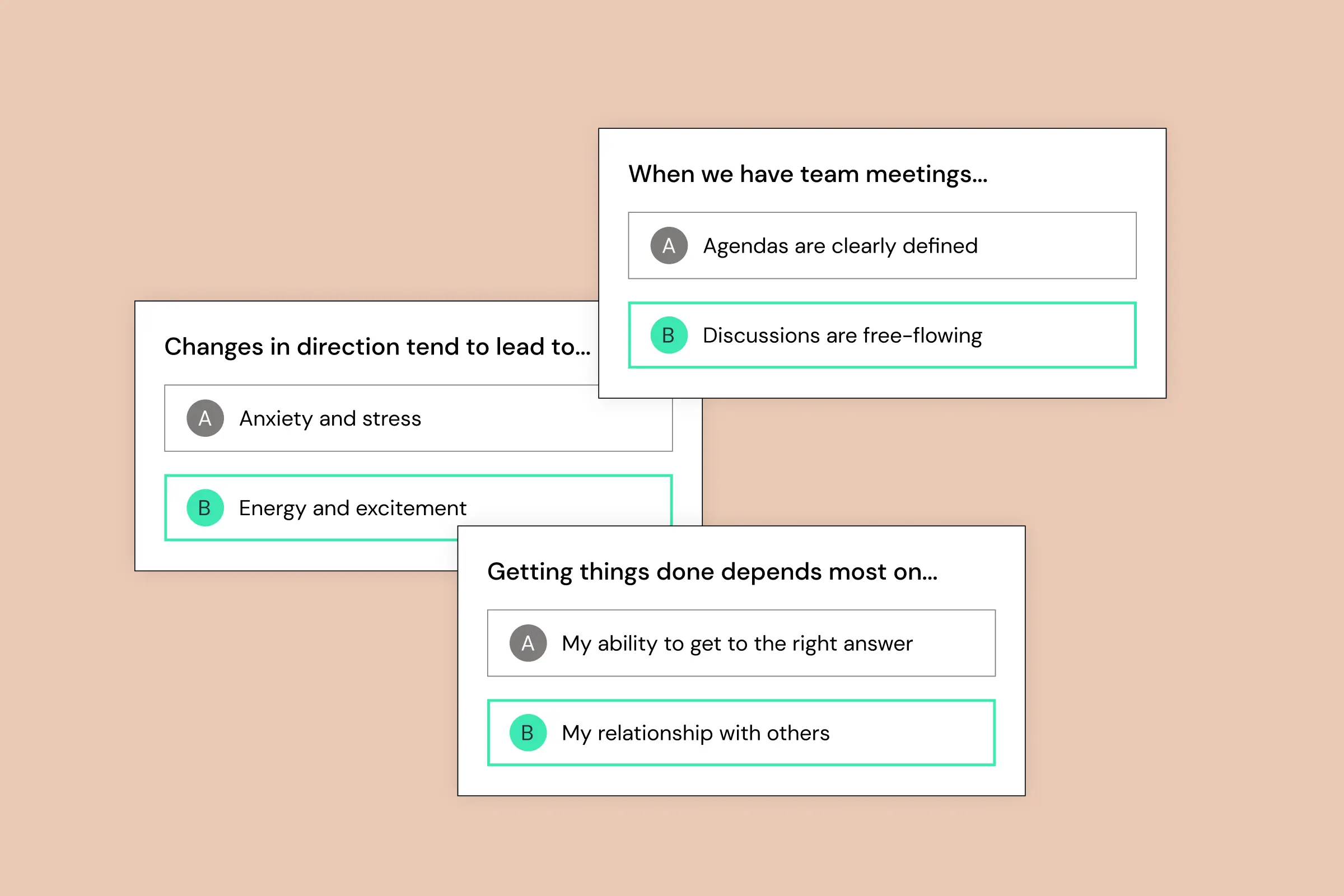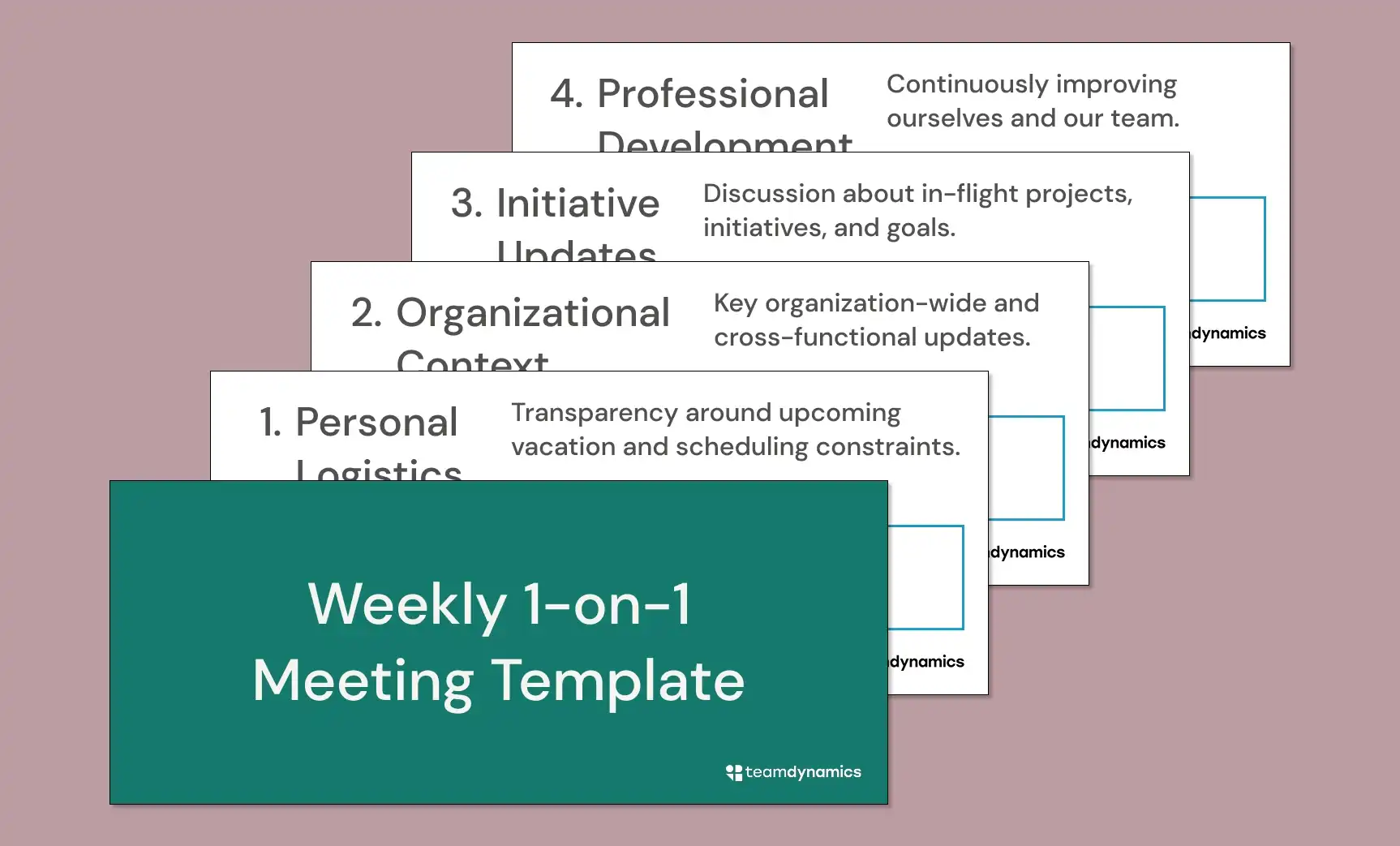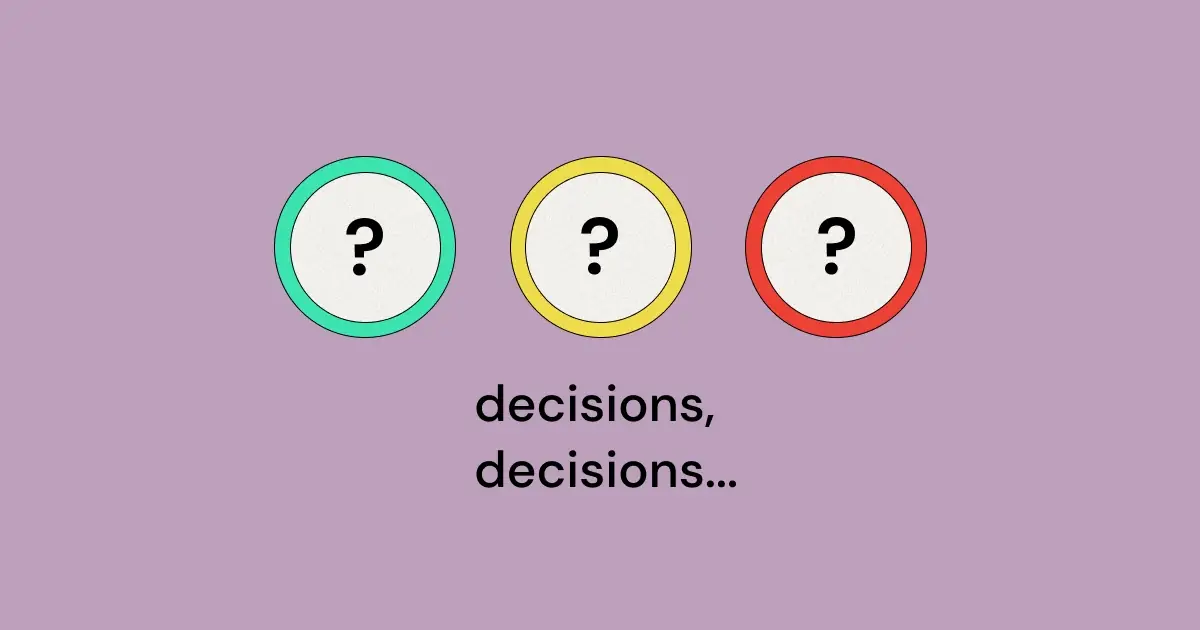1-on-1 meetings are a critical tool for effective leadership and team management. They offer a dedicated space for managers to connect with their employees, address concerns, and align on goals. However, without a clear structure and purpose, these meetings can quickly become unproductive. In this post, we’ll dive into proven tips and tricks to make your 1-on-1 meetings more effective. We’ll cover everything from meeting formats to the best questions to ask, including how to conduct pulse checks to gauge employee satisfaction.
Did you know that AI can help you run your weekly 1-on-1 meetings? Check out our guide to using ChatGPT in your 1-on-1 meetings!
Whether you’re a seasoned executive or new to management, these insights will help you make the most out of your time with your team.
Effective 1-on-1 Meeting Format
To ensure your 1-on-1 meetings are impactful and productive, it’s important to follow a few key practices. Here's a few tips for making the most of 1-on-1 meetings, which will help you get the most out of your time with each employee, fostering better communication and stronger relationships.
Structuring Your Meetings
A well-structured one-on-one meeting format sets the tone for a productive conversation. Start by setting a clear agenda. This can include a mix of work-related topics and personal check-ins. Typically, your one on one meeting format should include time for:
- Updates: Begin with a quick review of the employee’s recent work and achievements. This helps to acknowledge their contributions and sets a positive tone.
- Challenges: Discuss any obstacles or issues they’re facing. This is your chance to offer support and resources.
- Goals and Development: Focus on short-term and long-term goals. Discuss what steps are needed to achieve these goals and how you can assist.
- Feedback and Questions: End with an open discussion. Encourage your employee to share feedback about their work environment, team dynamics, and your management style.
Setting the Right Tone
Creating a comfortable and open environment is crucial. Start by expressing appreciation for their time and contributions. This builds rapport and makes employees feel valued. Use a conversational tone to encourage honest and transparent dialogue. Remember, this meeting is a two-way street—it’s as much about listening as it is about leading.
By following this structure and maintaining a supportive atmosphere, you’ll ensure that your 1-on-1 meetings are both efficient and meaningful. This not only helps in managing tasks but also in building stronger relationships with your team.
{{inline-cta}}
Consistency is Key
Regular scheduling of 1-on-1 meetings is essential. It shows your commitment to open communication and provides a reliable platform for employees to voice their thoughts. Here are some guidelines:
- Stick to a Regular Schedule. Consistency builds trust. Set a recurring time for your meetings, whether weekly, bi-weekly, or monthly. This helps employees prepare and ensures that important topics are not overlooked.
- Handle Rescheduling or Cancellations Professionally. Life happens, and sometimes meetings need to be moved. When rescheduling, do so promptly and with clear communication. Avoid canceling unless absolutely necessary, as it can signal that the meeting isn’t a priority.
Active Listening and Empathy
Effective communication is not just about speaking; it’s also about listening. In 1-on-1 meetings, your role is to understand and support your employees. Here’s how:
- Listen More Than You Speak. Give your employees the floor to express their thoughts and concerns. This shows that you value their input and are willing to take action based on their feedback.
- Show Empathy. Empathy is key to building trust. Acknowledge their feelings and experiences, even if you don’t fully agree. This fosters a supportive atmosphere where employees feel safe sharing their true thoughts.
- Ask Open-Ended Questions. Encourage deeper conversations by asking questions that require more than a yes or no answer. This can help uncover underlying issues or insights that might not surface otherwise.
Follow-Up and Action Plans
A productive 1-on-1 meeting doesn’t end when the conversation does. It’s crucial to follow up on the discussions and create action plans.
- Summarize Key Takeaways. At the end of the meeting, recap the main points discussed. This ensures that both parties are on the same page and understand the agreed-upon next steps.
- Create Actionable Steps. Develop a clear action plan based on the meeting’s discussions. Set specific, measurable, and achievable goals. This not only provides direction but also helps track progress over time.
- Set Clear Expectations and Timelines. Define what success looks like and establish deadlines for any tasks or projects. This helps maintain accountability and ensures that both you and your employee are aligned on priorities.
By following these tips, you can maximize the effectiveness of your 1-on-1 meetings. They are not just routine check-ins but powerful tools for building a strong, engaged, and high-performing team. Consistency, active listening, empathy, and clear follow-up actions will help you foster a positive work environment and drive continuous improvement.
50+ Key 1-on-1 Questions to Ask Employees
Asking the right questions during 1-on-1 meetings can make all the difference. It helps you understand your employees’ perspectives and address any concerns before they escalate.
Wondering how you can speed up your 1-on-1 preparation, and have more effective weekly meetings with your team? Check out our free downloadable 1-on-1 meeting template.
Here are some essential categories of 1 on 1 meeting questions to consider:
General 1-on-1 Questions
Asking general questions helps to establish a baseline understanding of your employee’s overall experience and feelings about their work.
- How are you feeling about your work overall?
- What has been the highlight of your week?
- Are there any challenges you’ve encountered recently?
- What are your main priorities for the upcoming week?
- How do you feel about the current direction of our team?
- Is there anything you’d like to discuss that hasn’t been brought up yet?
- How can I help you be more successful in your role?
- Do you feel like you have the resources you need to do your job effectively?
- Is there something you’re looking forward to at work?
- What do you enjoy most about your job right now?
Project-Related 1-on-1 Questions
These one on one questions for employees provide insight into the progress and challenges of current projects, ensuring alignment and offering support where needed.
- How are your current projects progressing?
- Are there any blockers or challenges you’re facing with your projects?
- Do you have all the information you need for your current tasks?
- How can I support you with your ongoing projects?
- Are there any deadlines that you’re concerned about?
- What’s one thing that’s going well with your projects?
- Is there anything you would like to change about how we approach projects?
- How do you prioritize your tasks and projects?
- Are there any projects you’re particularly excited about?
- How do you feel about the workload from your current projects?
Team-Related 1-on-1 Questions
Discussing team dynamics helps identify strengths and areas for improvement in collaboration and communication within the team.
Are you looking to better understand your team dynamics and improve your teamwork? TeamDynamics can help!
- How do you feel about the team’s collaboration and communication? Maybe we should try TeamDynamics?
- Are there any team dynamics that you think could be improved?
- Do you feel supported by your team members?
- How can we improve our team meetings?
- What’s something you appreciate about our team culture?
- Are there any team-related issues you’d like to discuss?
- How can we better utilize each team member’s strengths?
- Do you feel like your contributions to the team are valued?
- How can we create a more inclusive team environment?
- Is there anyone on the team you’d like to collaborate with more closely?
Career Development 1-on-1 Questions
Inquiring about career development shows commitment to the employee’s growth and helps align their aspirations with organizational goals.
- What are your short-term career goals?
- Where do you see yourself in the next 1-2 years?
- Are there any skills you want to develop or improve?
- What opportunities for growth are you interested in?
- How can I support your career development?
- Do you feel like you’re growing in your current role?
- Are there any training or learning resources you’d like to explore?
- What are your long-term career aspirations?
- Have you considered any new roles or responsibilities?
- How do you feel about your career progression so far?
Work-Life Balance 1-on-1 Questions
These 1 on 1 questions to ask employees are crucial for understanding and supporting employees’ well-being, ensuring they maintain a healthy balance between work and personal life.
- How do you feel about your current work-life balance?
- Are you able to disconnect from work when needed?
- Do you feel like you have enough time for personal activities?
- Are there any aspects of your job that are affecting your personal life?
- How can I help you achieve a better work-life balance?
- Do you feel like you’re working too many hours?
- Is there anything we can do to make your workday more manageable?
- Are you satisfied with the flexibility in your work schedule?
- Do you feel supported in taking time off when needed?
- Is there anything we can do to help reduce work-related stress?
Feedback 1-on-1 Questions
Seeking feedback fosters an open dialogue, providing opportunities for improvement and reinforcing positive behaviors.
If you're looking for help writing your employee reviews, download our Annual Performance Review Template, and read our guides for how to use ChatGPT to give employee feedback and how to use ChatGPT to write your reviews!
- How do you prefer to receive feedback?
- Is there any feedback you have for me?
- What’s one thing you think we could improve as a team?
- Do you feel like you receive enough feedback on your work?
- How do you think you’ve handled recent challenges?
- Is there anything you’ve learned recently that you found valuable?
- What’s one thing you’d like to receive more feedback on?
- Do you feel comfortable giving feedback to others?
- Is there a specific project where you’d like more guidance?
- What’s one area where you’d like to see more support from me?
Pulse Check 1-on-1 Questions
"Pulse check? Meaning what?" A pulse check is an informal way to assess an employee’s emotional and mental state. Unlike formal reviews, it offers a more candid look at how employees are feeling. Conducting pulse checks allows you to gauge the overall morale and engagement of your employees, addressing potential issues before they escalate.
- How are you feeling about your job overall?
- Do you feel motivated and engaged in your work?
- Is there anything that’s been on your mind recently?
- How would you rate your current job satisfaction?
- Do you feel valued and appreciated at work?
- How do you feel about the level of communication in the company?
- Is there anything that’s affecting your morale?
- How do you feel about the company’s direction and goals?
- Do you feel like you’re making a meaningful contribution?
- Is there anything you’d like to see change in the company?
50+ Key 1-on-1 Questions to Ask Your Manager
Asking the right questions during 1-on-1 meetings with your manager can make a big difference in your career development and overall job satisfaction. These meetings are a valuable opportunity to understand your manager’s perspective, clarify expectations, and address any concerns you may have. If you’re looking to make the most out of your weekly 1-on-1s, here are some essential categories of questions to consider:
General 1-on-1 Questions
Asking general questions helps you establish a baseline understanding of your manager’s expectations and priorities.
- How do you feel about the progress we’ve made this week?
- What should I focus on in the upcoming week?
- Are there any areas where I could improve my performance?
- What are the main goals for our team this month?
- How can I better align my work with our team’s objectives?
- Is there anything I should be aware of that’s happening in the company?
- What’s the most important thing I should prioritize right now?
- Are there any upcoming changes I should prepare for?
- How can I be more effective in my role?
- Is there anything you’d like me to start doing differently?
Project-Related 1-on-1 Questions
These questions provide clarity on current projects, helping you stay aligned and address any challenges.
- Can we review the status of my current projects?
- Are there any adjustments needed for my project timelines?
- Do you foresee any potential challenges with these projects?
- What are the key milestones we need to hit this month?
- How can I better prioritize my tasks?
- Do you have any feedback on my approach to these projects?
- Are there any new projects or responsibilities coming up?
- What’s one thing I could do to improve the outcomes of these projects?
- How can we ensure better collaboration on these projects?
- Are there any project goals that need more focus?
Team-Related 1-on-1 Questions
Discussing team dynamics can help improve collaboration and communication within the team.
- How do you feel about our team’s current collaboration?
- Are there any team dynamics we should address?
- What can I do to contribute more effectively to the team?
- How can we improve our team meetings?
- Do you think we’re utilizing everyone’s strengths effectively?
- Is there any feedback from the team that I should be aware of?
- How can we better support each other as a team?
- Are there any team-building activities we should consider? Maybe we should try TeamDynamics?
- How can I help create a more inclusive team environment?
- Is there a way to improve our team’s communication channels?
{{inline-cta}}
Career Development 1-on-1 Questions
Inquiring about career development shows your commitment to growth and helps align your career path with organizational goals.
- What opportunities for growth do you see for me?
- How can I prepare for future roles or responsibilities?
- What skills should I focus on developing?
- Are there any training or learning opportunities you recommend?
- What are the key competencies needed for advancement in this organization?
- How do you see my role evolving over the next year?
- Can we discuss potential career paths within the company?
- What do you think are my strengths, and how can I leverage them?
- Are there any areas where you think I should improve?
- How can I better position myself for future opportunities?
Work-Life Balance 1-on-1 Questions
These questions are important for maintaining a healthy balance between work and personal life.
- Do you think I’m managing my work-life balance well?
- How can I better manage my workload?
- Are there any flexible work arrangements we can consider?
- Do you have any tips for managing stress at work?
- How can I ensure I’m not overextending myself?
- Is it okay to adjust my work hours if needed for personal reasons?
- Can we discuss my current work schedule and any necessary adjustments?
- How can I prioritize tasks more effectively to avoid burnout?
- Is there anything I can do to make my workdays more manageable?
- What resources are available for maintaining work-life balance?
Feedback 1-on-1 Questions
Seeking feedback helps you understand how to improve and contribute more effectively.
If you're looking for help writing your self evaluation, download our Annual Self Evaluation Template and read our guide for how to use ChatGPT to write your self evaluation during reviews!
- Can you provide feedback on my recent work?
- How can I improve my performance in specific areas?
- Is there any feedback you have on how I handled recent challenges?
- What’s one thing I could have done better this past week?
- Do you have any suggestions for how I can improve communication with the team?
- How can I better meet your expectations?
- What’s one area where I can make a bigger impact?
- Is there anything I should stop doing?
- What’s one thing you think I do well?
- Can we discuss my progress on the goals we set?
Pulse Check 1-on-1 Questions
Pulse checks help you gauge the overall morale and engagement of the team and the company.
- How do you think our team is feeling overall?
- Do you feel the team is motivated and engaged?
- Are there any concerns you have about team morale?
- How do you feel about the company’s direction?
- Is there anything we can do to improve team spirit?
- How do you perceive the level of communication within the team?
- What’s one thing we could change to improve the work environment?
- Do you feel like our team is aligned with the company’s goals?
- How can we better support each other during busy times?
- Is there anything we should be doing to improve team well-being?
These questions are designed to foster open communication, provide clarity, and help you grow in your role. They offer a comprehensive approach to understanding your manager’s expectations, your team dynamics, and your career trajectory.
Conclusion
1-on-1 meetings are a vital component of effective leadership and team management. When conducted thoughtfully, they provide a platform for open communication, foster stronger relationships, and drive individual and team growth.
To make the most of these meetings, focus on consistency, create a welcoming environment, and ask the right questions. Whether it’s understanding an employee’s career aspirations, conducting pulse checks to gauge their well-being, or discussing team dynamics, the right approach can yield valuable insights. Remember to listen actively, show empathy, and always follow up with clear action plans.
By implementing these strategies, you’ll not only enhance the productivity and satisfaction of your team but also build a culture of trust and continuous improvement. Now, it’s time to put these tips into action and transform your 1-on-1 meetings into powerful tools for success.




.png)














































